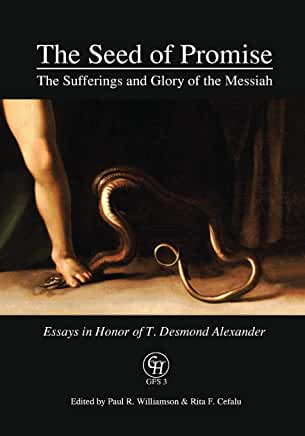Dr. Rita F. Cefalu currently teaches courses in college preparedness for the University of Saint Katherine in San Marcos, CA. She is a graduate of Queen’s University Belfast (Ph.D.), Wheaton College (M.A.), and Westminster Seminary CA (M.A.). Previously she lectured in theology and religious studies for the University of San Diego, San Diego State University, and several State community colleges. Dr. Cefalu has also served as registrar and dean of women students for Westminster Seminary CA, and is a published author. She is married to Richard and they presently reside in CA.
You Should Know T. Desmond Alexander
Exploring God’s Plan for Life on Earth With a Shepherd's Heart
Loading...
by: Dr. Rita Cefalu
Introduction
Not many people have the opportunity to interview someone who will undoubtedly go down in history as making a valuable contribution to biblical scholarship and the church. In this essay, I have the privilege of introducing you to Dr. T. Desmond Alexander (Desi), and also sharing some of his own thoughts on the subjects of Christian character in academia, Biblical Theology and scholarship in service of the church.
Who is Desi Alexander?
Desi is an internationally recognized scholar, best known for his trail blazing work in the field of Biblical Theology (BT).[1] Born in Northern Ireland in 1955, he attended Ballymena Academy and went on to study at the Queen’s University of Belfast (QUB) where he received a BA in Semitic studies in 1977 (first class honors). Later Desi completed Ph.D. work in the same department (1983) under the supervision of Dr. Gordon J. Wenham, also a world class conservative Old Testament scholar.
Before taking up the post of Senior Lecturer in Biblical Studies for Union Theological College (UTC) in Belfast (2009-present), Desi had the privilege of serving the Presbyterian Church in Ireland (PCI) for ten years as its Director of Christian Training. Prior to that, he lectured for 19 years in Semitic studies for QUB, and has written and contributed to a large number of academic and reference books in the field of biblical studies. His areas of expertise include the Pentateuch and BT. Desi also serves as an elder for Fitzroy Presbyterian Church in Belfast, Northern Ireland. He is married to Anne. They have two adult children and have recently become the proud grandparents of a baby girl (2020)!
On Christian Character in Academia
Desi rightly observes that the Christian faith cannot be separated from living as a Christian, regardless of one’s vocation. He notes that in the realm of academia this is especially important. In the United Kingdom, the university trains scholars to be prominent and to think independently, which tends to promote a certain self-centeredness and arrogance. These attitudes run counter to Christian values in terms of understanding the limitations of knowledge and our dependence upon revelation to really understand life. Christian values ought to promote a degree of humility in recognizing that we don’t have all the answers, and this humility ought to shape the way we think about things.
On Biblical Theology
Desi’s understanding of BT has developed significantly over the years. His interest in the subject is of a personal and practical nature. Desi is the kind of scholar who seeks to produce something that will benefit others. For him, BT is about grasping the unity of Scripture, understanding how the different parts contribute to that unity, how the diverse material is complementary, not contradictory, and how the Old Testament (OT) in some ways anticipates the New Testament (NT). As such, BT presupposes the Canon of Scripture,[2] which is to say that the biblical theologian essentially accepts the divine inspiration of the collection of books that make up the Bible. While it is true that human authors had their role to play in the process, it is equally true that the material they produced owes its inspiration and unity to the work of the Holy Spirit.
Desi’s biblical theological journey began when he was an OT Ph.D. student working on the Abraham material in Genesis. During that time, he struggled with how this material related to him as a Christian. From his perspective, most OT scholars don’t answer that question well. They don’t really engage in BT, which is to say, they don’t think about how to read the OT as a Christian. OT scholars often misinterpret the material because they aren’t tuned in to what’s really important. For example, the seed theme in Genesis very clearly points to the advent of Christ, but this trajectory is often ignored by most commentaries on Genesis. What’s lacking is an appreciation for the big picture, which also helps one to understand the individual books better.
Something of this big picture began to emerge for Desi in the late 1980s. These thoughts are recorded in an article he wrote on the seed formula and genealogies in Genesis.[3] In it, he traced the family line of Adam (through Seth) to Judah, showing that by the end of Genesis there is a whole family line that will eventually lead to Jesus Christ. By recognizing the prominence of the term seed, Desi was able to tune in to what was really important for Genesis. This discovery was the beginning of his being able to see something of the unity of Scripture, and to speak to the earlier question of how to relate the OT to his Christian faith. But there were other things that helped along the way.
Significantly, Desi was asked to contribute to a volume of essays on the messianic theme in Genesis.[4] This got him thinking more about how Genesis pointed to Christ. Yet something puzzled him. While it was clear that the messianic trajectory led to Christ through the tribe of Judah, what was unclear was why Genesis concluded by giving equal prominence to Joseph’s son, Ephraim (Gen 49:8-12; 22-24 ). In other words, why did Genesis end by associating the messianic expectation with both Judah and Joseph? Intriguingly, Psalm 78 would provide the answer.
It appears that up until the time of David, the messianic expectation continued through the line of Joseph through Ephraim. The tabernacle, the center of Israelite worship, had been located in Shiloh (Ephraim territory) from the days of Joshua (also an Ephraimite) until the prophet Samuel. But over time, Ephraim became increasingly corrupt. Therefore, God rejected Shiloh and Ephraim (Psa 78:60, 67), and chose David and Jerusalem instead (Psa 78:69-72). Psalm 78, therefore, provides the missing piece to the puzzle for why Genesis ends with the royal expectation coming from either the tribe of Ephraim or Judah, thus solving the tension by giving the reason for God’s rejection of the one and his selection of the other. Keeping this big picture in mind helps readers to make better sense of the individual books of the Bible, and at the same time to discover something of their unified and complementary nature.
On Scholarship in Service of the Church
Desi did not set out in life with the intention of becoming a biblical theologian. However, as I step back and look at the big picture of his life, the unity and complementary nature of God’s providence clearly come into view. It was God’s intent to develop Desi as a biblical theologian, whose primary beneficiary would be the church.
When QUB decided to liquidate the Semitic department, Desi had to look for employment elsewhere. At the time, there was only one position in Northern Ireland that fit his training and experience. This was for the Director of Christian Training with the PCI, a position which he didn’t think he would get. He and Anne even explored the possibility of moving to the United States (having been offered a position at a prominent seminary in the South). Providentially, however, Desi was offered the Directorship. This position allowed him to leave the academic agenda behind and to explore more fully the use of Scripture in service of the church (which ironically gave him more academic material!).
The providential shift from academia to the Director of Christian Training took him in an entirely different direction, which has proved to be quite fruitful. Had Desi remained an OT lecturer, he would not have had the opportunity to grow as a biblical theologian, seeing that BT is a bit of a “Cinderella” in the academic world. It doesn’t fit in well, because biblical scholars tend to view themselves as either OT or NT, and they don’t think that the two are complementary.
In 2009, there came yet another shift. Desi was asked to become a full time lecturer for UTC. In some ways, returning to full time lecturing for UTC was not that different from teaching for QUB. The main difference was one of emphasis. Desi now spends more time helping students understand the literary dimension of the biblical text, thanks to his development as a biblical theologian. While he sometimes mentions historical critical issues in passing, he doesn’t major in them as was more the emphasis when he began teaching for QUB.
Conclusion
I for one am grateful that God took Dr. T. Desmond Alexander (Desi) in the direction that he did, and that I had the privilege of studying under him when I did. I am also glad that those who read this introduction will have a better understanding of who he is, and trust that you will be blessed by his works. I invite you to consider also God’s providential ways in your own life. I conclude this essay with the following reflections from Desi (in his own words):
If I have been fortunate to have some impact, it really is because of the providence of God. I have been fortunate to have good mentors and opportunities to develop my gifts, in addition to being asked to do certain things at certain times. These opportunities opened doors that I might not have expected. For example, when Kregel took over the publication, From Eden to the New Jerusalem, they changed the subtitle to: An Introduction to Biblical Theology.[5] The original version was: Exploring God’s Plan for Life on Earth (UK).[6] Had I been asked to write an introduction to BT, it would have been a very different book. It’s been a blessing in disguise, but it wasn’t originally intended to be an introduction. I think that is what people appreciate. When you see biblical theology being done well, it resonates. However, I don’t see myself doing anything special, other than trying to explain the Bible. I have been blessed that God has very kindly on occasion opened the Scripture, allowing me to see and connect things that have proved to be a benefit to others.
Soli Deo Gloria!
[1] Brian Rosner helpfully defines biblical theology “as theological interpretation of Scripture in and for the church. It proceeds with historical and literary sensitivity and seeks to analyze and synthesize the Bible’s teaching about God and his relationship to the world on its own terms, maintaining sight of the Bible’s overarching narrative and Christocentric focus.” See NDBT, Eds. T. Desmond Alexander and Brian Rosner (Leicester/Downers Gove: Inter-Varsity Press, 2000), 10.
[2] “Canon” comes from the Greek word “kanōn,” meaning “rule, standard, norm.” NIDONTTE, 288. The term was first used by Christian writers in the 4th century AD to refer to the collection of Scriptures that are believed to be divinely inspired and therefore authoritative. For an article on the canon of Scripture, see R. T. Beckwith in NDBT, 27-34.
[3] T. Desmond Alexander, “From Adam to Judah: the significance of the family tree in Genesis,” EvQ, 61 (1989), 5-19.
[4] T. D. Alexander, “Messianic ideology in the book of Genesis” in The Lord’s Anointed: interpretation of Old Testament messianic texts, Eds. Gordon Wenham, et al (Grand Rapids/Carlisle: Baker Book House/Paternoster Press, 1995), 19-40.
[5] T. Desmond Alexander, From Eden to the New Jerusalem: An Introduction to Biblical Theology (Grand Rapids/Nottingham: Kregel/InterVarsity, 2008/2009).
[6] The contents of which had been originally produced for a different audience when he served as Director of Christian Training.
SHARE THIS ARTICLE
Loading...
Loading...
Rita Cefalu
's
featured book(s)
Read more in these categories
Loading...
Today we are joined by Stephen Brett Eccher to discuss the firebrand of fidelity that is Ulrich Zwingli in connection with Eccher’s new book “Zwingli the Pastor: A Life in Conflict” from Lexham Press.
Reviewed by Charles Ivey
How did the great Neo-Calvinist theologian Herman Bavinck view and interact with church history? Cameron Clausing’s Theology and History in the Methodology of Herman Bavinck is a weighty and vital contribution to the discussion around this question...
Let Twitter rage; Douglas Wilson is the people's Theologian.
Join us for a conversation with Douglas Wilson, where we delve into his recent book, 'Mere Christendom,' explore the unexpected blessings of online trolls, examine the remarkable overlap between Abraham Kuyper and Douglas Wilson, and celebrate the genius of whoever is behind Canon Press' Twitter account (by the way, everyone...





Interview with Cefalu at Reformed Forum here: https://reformedforum.org/podcasts/ctc697/
T Desmond Alexander (Desi) is now my second reformed Christian that I like. Him and Herman Bavinck. This is getting dangerous. On a serious note, Desmond’s book “From paradise to the promised land” is an exceptional book that I think should be read and studied by every seminary student. Really enjoy his academic work.
I discovered Dr. Alexander’s writings in the Bible Illustrator commentary. I find his writings eloquent, insightful, inspiring, and thought-provoking. I thoroughly enjoy reading his works!!